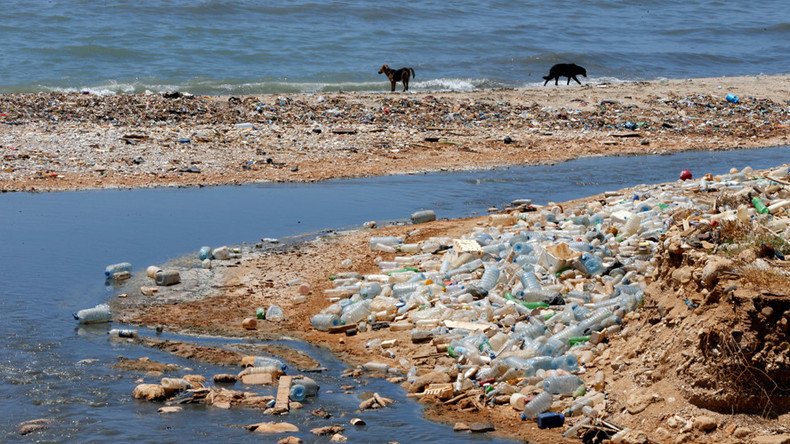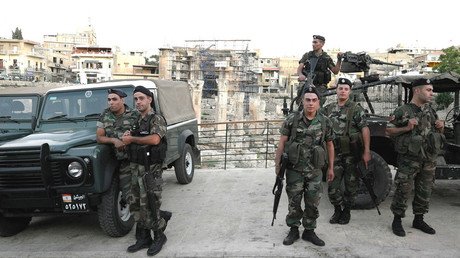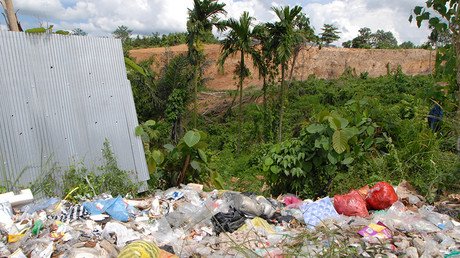Lebanon’s dumping of toxic garbage into the Mediterranean stinks of EU corruption

The EU’s farcical ‘foreign policy’ in the Middle East is failing in Lebanon, where dumping toxic garbage into the Mediterranean Sea is creating a massive threat to the entire planet. But what’s the link with Syria’s refugees?
Recently, a government minister here admitted that Lebanon’s policy towards its garbage crisis was to simply dump 2 million tons of toxic garbage into the Mediterranean Sea.
My own investigation revealed, however, a side to this shocking story which few editors of giant media titles around the world could believe. Until now.
The Costa Brava ‘landfill site’ right next to Beirut airport holds a filthy secret that a large number of environmentalists, leading academics and corruption experts all know and have revealed to me in a series of recorded interviews.
Not only did the EU know about the massive sea-dumping operation, which was built at the end of the summer of last year, but the EU’s own ‘embassy’ here in Beirut deliberately kept quiet about it. Why? Because it did not want to annoy the Lebanese government, which is hosting almost 2 million Syrian refugees.
Let that sink in for a moment.
The European Commission is keeping tight-lipped about what might be the largest environmental calamity in the Eastern Mediterranean – which not only threatens marine life, but also the health of Europeans holidaying in Greece – because it is too afraid of the political fall-out in Europe [Read: Germany] if Syrian refugees start to leave Lebanon and head for Europe.
Of course, no one is suggesting that the glamorous French EU delegation here in Beirut kept quiet and played dumb, because they have their careers to consider too. But Christina Lassen, head of the Delegation of the European Union to Lebanon, has some explaining to do.
Hundreds of millions of euros are spent each year on policing EU member states and their environmental misdemeanors; hundreds more on jobs for eurocrats in EU institutions; and hundreds more on EU-sponsored films, brochures and paid TV spots. And then there’s the EU ‘External Action Service’ which has had its own number of scandals as it soaks up a cool 700 million euros a year, much of which goes to support lavish embassies around the world and ‘diplomats’ who appear to live the high life.
But what is really the job of this super diplomacy outfit?
In Lebanon, it was clearly to keep this tiny country’s government happy at any cost – even the health of Europeans who cough up a 150bn euros a year to keep the EU project running – as corruption comes in many forms.
Lebanon is ranked by Transparency International as one of the most corrupt countries in the world. And yet it receives well over 200 million euros a year in cash from Brussels just to contain 1.8 million Syrian refugees. It’s actually not even a lot of money. For this pathetic amount, Europe has to console itself that it won’t have a refugee problem from Lebanon in exchange for possibly some of its 400 million citizens getting cancer from swimming in contaminated waters or eating contaminated fish. Add to that the gradual extinction of indigenous turtles who lay their eggs on Lebanese beaches, and the stink just fills your lungs.
Fishy business snares EU holiday makers
Think this is far fetched? Not according to one of Lebanon’s leading expert academics at the American university who confirms the pollution is heading towards Europe.
“The pollution never stops at one point,” Professor Najat A. Saliba of the AUB tells me. “The ocean is a living beast and currents are always in motion. Trash and leachates will move mainly from the south to the north as this is the prevalent wind in Lebanon."
Her further explanation sounds almost apocalyptic as the entire region could be affected by dire health implications.
“The environmental impact on the water, animal life, ocean biodiversity and the whole marine ecosystem is horrific... Leachate full of toxins will be seeping through the piles to contaminate the marine life. In addition to the toxins, organic matters will use up the oxygen in the sea and as such deprive the marine life from its oxygen,” she warns.
“Health damages also come from eating fish, increase in bacteria in the air, and infiltration of sea water into the coastal wells,” Professor Saliba concludes.
This point has been seized upon by one British MEP, who slammed it as an "hypocritical and a shameful indictment on the incompetence of the EU.”
"What is going on here is an environmental disaster with this toxic waste spreading to other countries from the sea's currents and polluting anything it gets in the way of," says UKIP's MEP Mike Hookem, its party's Fisheries spokesman.
"Not only will sea life be at risk but people could be too, through contaminated food and through polluted water particularly as it spreads up through Mediterranean countries where people go on holiday," he warns.
One explanation why the Lebanese government has allowed the EU projects to fall apart is that its leaders in Beirut have a vested interest in other, bigger garbage contracts, if the Costa Brava plan is finally scrapped. Lebanon also has a legacy of its corrupt leaders taking areas of the coast, filling it with garbage (and ultimately concrete) and them making hundreds of millions of dollars in developing the plots as luxury apartments.
Presumably, the EU’s highly informed diplomats know about that as well though.
'Pay off for Syrian crisis'
Laury Haytayan is an anti-corruption campaigner in Lebanon who believes that the “EU surely knows about the sea dumping of the garbage” but argues that “the garbage crisis is keeping politicians in power as it brings in money” even including contracts around the sea dump so “it’s hardly surprising that the EU projects don’t work."
What she is referring to is 13 EU-funded sorting and composting centres which are a shambles and, in reality, have only served as cash cows for corrupt politicians, which a number of experts also blame as contributing to the government’s "sea dump."
But no one is holding their breath for the top brass in Brussels to even acknowledge what is going on with their own diplomats.
Mike Hookem scolds the EU for the massive error but takes it further. "To make matters worse the EU diplomatic corps has one of their erzatz 'embassies' in Lebanon so Brussels can't claim to know what's going on - although incompetence has admittedly never been a firing offence in the EU", adds the UKIP MEP.
"This is all just a pay off for the Syrian refugee crisis which the EU can't get a handle on because it is more obsessed with attacking Russia and Assad than it is dealing with ISIS," claims Hookem.
In reality, the EU is probably not guilty of incompetence. In my view, the role of its diplomatic service is to engage with corrupt, backward countries – often with appalling human rights records – to ensure that they comply with a contingent requirement of Brussels: to assist the EU in its PR campaign to make it look much more relevant and important than what it really is. Give our EU chief the over-the-top VIP treatment when she visits, get your journalists to write up our press releases verbatim and do the ‘grip-n-grin’ photos. And never criticize our policies. That’s the deal.
The Lebanon story is about refugees. The millions of refugees poised on the EU’s perimeter – in Lebanon or in Turkey - are there because of failed states which are supported by the EU through slush funds, or payouts to corrupt governments – dressed up as state-building tools – but in reality are simply bribes, pay offs. No one is kidding themselves that the Barcelona Process is really anything other than a broken URL link on the European Commission’s own website (which it really is).
In Lebanon, the EU keeps quiet not only about the garbage scandal but much more besides. Many Syrian refugees have resorted to either slavery (often child) or prostitution for young girls. This tiny country is also falling into a chasm of authoritarian rule which is usually associated with African states.
Just recently a video went viral of peaceful protesters being brutally beaten, while new measures are being adopted all the time here to crackdown on anyone who criticizes the state (similar to Gulf Arab countries). I can’t be the only one who notices the tight-lipped EU diplomats who assist in this process by tacit approval.
Remarkably, the EU’s own diplomatic service doesn’t even generate good PR though for Brussels, such is its colossal failure as a fake news conduit. But the stench of graft which reminds me of 1999 has returned to my nostrils in Beirut. The EU today has no whistleblowers or investigative journalists holding it to account, due to its own crackdown so that a 1999 scandal would never repeat itself. It is a power-crazed unhinged beast which seeks survival at any cost, even of its own people.
The EU’s relationship with Lebanon, like scores of other poor countries it uses as a means to promote itself, just stinks.
In 1999, in Brussels, I witnessed and reported on the collapse of the European Commission whose executive resigned en masse under a cloud of shocking corruption allegations involving EU commissioners themselves manipulating the system by employing friends who, in turn, scooped million dollar contracts. The scandal not only threw a spotlight on the guilty, but also on the system itself which spectacularly failed to root out corruption and embezzlement from within the EU institutions.
The Barcelona Process, a bold and ambitious plan for the EU to harness Mediterranean countries closer to the Brussels sphere kicked off four years earlier. It also aimed to guide these countries on Europe’s periphery to modernize and improve their human rights aligning themselves with the moral tutelage which European Commission Presidents used to dish out in those days, while at the same time destroying at least four whistle blowers (in 2002) and arresting and charging journalists on trumped up charges.
The case of Hans-Martin Tillack in 2004 is well documented and will be remembered for the police banging on his door at 5am in the morning and taking him and his computers away, with a Belgian cop telling him ‘it’s not as bad as Burmah, eh?’
So, fast forward to The Lisbon Treaty in 2010 which gave the EU its own foreign policy along with up to 1 billion euro a year budget to create its own ‘External Action Service’. But since the EEAS started, its own venal working methods just seem to exacerbate how corrupt Brussels is and will probably always be.
It’s not just that the Barcelona Process was such an outstanding failure – Libya, Syria, Lebanon (2006) – and not to mention the Arab Spring. Today, the EU’s farcical foreign policy is actually doing more harm than good as it’s not even serving its own corrupt masters in Brussels.
More recently you might be astounded to see how far and how desperate the EU foreign policy chief Federica Mogherini is prepared to go, just to give her own department credibility and serve the EU machine with PR capital. From offering jihadists in Syria hundreds of millions of dollars in cash to stop fighting, right through to planning to secure a UN mandate so EU battleships could bomb refugee boats coming from Libya, there’s plenty to read for a good laugh.
But the darker side to the EU’s diplomatic service is no joke.
Indeed, there could never have been a more febrile example of how corrupt, ill-conceived and hypocritical the EU’s foreign policy is, than in Lebanon today.
Martin Jay is based in Beirut and can be followed on @MartinRJay
The statements, views and opinions expressed in this column are solely those of the author and do not necessarily represent those of RT.
















